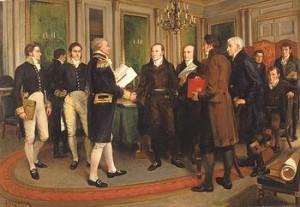Peace is an elusive thing. For many, the attraction of the Christmas season is the momentary fulfillment of that dream, the wonderful moment of 'Peace on Earth'. For one night, it seems possible. As Christmas approaches, we experience a sense of 'Peace on Earth'. A few times in history, this sense of peace at Christmas had real impact on human affairs. A little known example is the the signing of the Treaty of Ghent on Christmas Eve, December 24, 1814, ending a war, the War of 1812, between the United States and the British Empire and their allies.
Peace is an elusive thing. Everyone wants peace, yet few seem to actually possess it in any substantive form. For many, the attraction of the Christmas season is the momentary fulfillment of that dream, the wonderful moment of 'Peace on Earth'. For one night, it seems possible. As Christmas approaches, we experience a sense of 'Peace on Earth'. A few times in history, this sense of peace at Christmas had real impact on human affairs. During World War I a series of widespread, unofficial ceasefires took place along the Western Front around Christmas 1914. This so-called Christmas truce is seen as a symbolic moment of peace and humanity amidst one of the most violent events in modern history. Another example, little known, is the the signing of the Treaty of Ghent on Christmas Eve, December 24, 1814, ending a war, the War of 1812, between the United States and the British Empire and their allies.
The War of 1812
This war was an intense military conflict which resulted in no territorial change, but a resolution of many issues remaining from the American War of Independence. The separation, begun in 1776, sealed by treaty in 1783, had been made by war, a long war, which left angry feelings. Beside these unpleasant memories there were also controversies over important material interests that emerged from time to time: trade restrictions brought about by Britain's ongoing war with the French Empire, the impressment of American merchant sailors into the Royal Navy, British support of American Indian tribes against American expansion, etc. The United States declared war on June 18, 1812. This was the first time that the United States had declared war on another nation.
Diplomatic Negotiations
By 1814, both sides were weary of a costly war that offered little but stalemate. They both sent delegations to the neutral Flemish town of Ghent, (then) The Netherlands. Diplomatic negotiations began in early August. The Americans sent top commissioners, John Quincy Adams, James A. Baynard, Henry Clay, Jonathan Russell and Albert Gallatin, while the British sent minor officials who kept in close touch with their superiors in London, the Right Honourable James Lord Gambier, late Admiral of the White, then Admiral of the Red Squadron of His Majesty’s Fleet, Henry Goulburn, Esq. member of the Imperial Parliament and Under Secretary of State, and William Adams, Esq. Doctor of Civil Laws.
Peace on Christmas Eve
In the late afternoon of December 24, 1814, on Christmas Eve, the commissioners agreed upon signing a peace treaty, the Treaty of Ghent. However, the treaty was hardly more than an instrument that served to end the war and restore the status quo ante bellum. It said nothing about impressment, nothing about indemnities, etc. Boundary problems, territorial claims, all other problems were to be settled later by joint commissions. At six hours, with darkness spreading over Ghent and the carillon of St. Bavon pealing its Christmas message, three English and five American commissioners gathered about a long table and officially attested to a Treaty of Peace and Amity Between His Britannic Majesty and the United States of America. When all had signed, Lord Gambier expressed his hope that the treaty would be permanent. John Quincy Adams, as he tells us in his diary, in turn, too, assured Lord Gambier of his hope that it would be the last treaty of peace between Great Britain and the United States. At six thirty the American delegation dissapeared into the solemn night of Christmas Eve with peace in their pockets. Almost 208 years later, the Treaty of Ghent, proved indeed to be a lasting peace between Great Britain and the United States. A little known but most durable monument it has been.
[The following titles are not available in the PPL collection]
- Ashworth, T., Trench Warfare 1914-1918: the Live-and-Let-Live System, London, Pan, 2000.
- Boyle, D., Peace on Earth: the Christmas Truce of 1914, London, Endeavour Press, 2014.
- Brown, M. and S. Seaton, Christmas Truce: The Western Front, 1914, New York, Hippocrene Books, 2001. (Rev. and expanded edition, original 1984)
- Crocker, T.B., The Christmas Truce: Myth, Memory, and the First World War, Lexington, University Press of Kentucky, 2015.
- Eksteins, M., The Rites of Spring, New York, NY, Mariner Books, 2000.
- Weintraub, S., Silent Night: the Remarkable Christmas Truce of 1914, London, Pocket Books, 2002.
